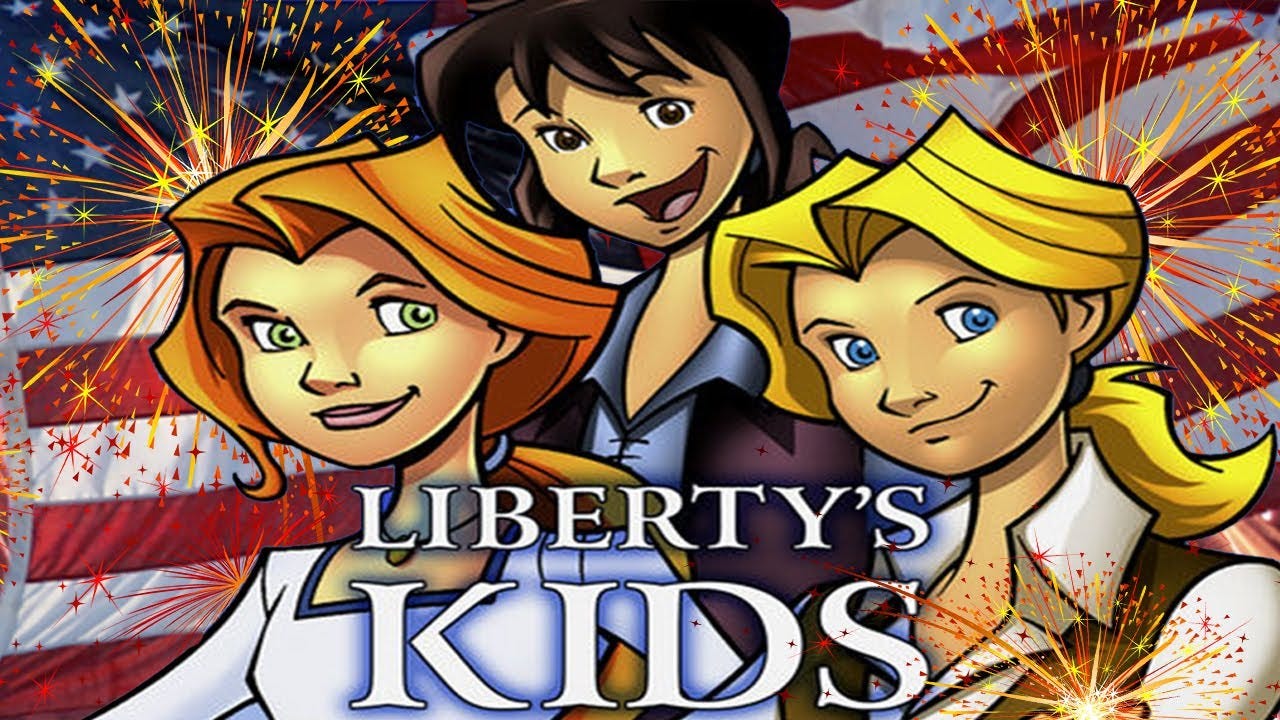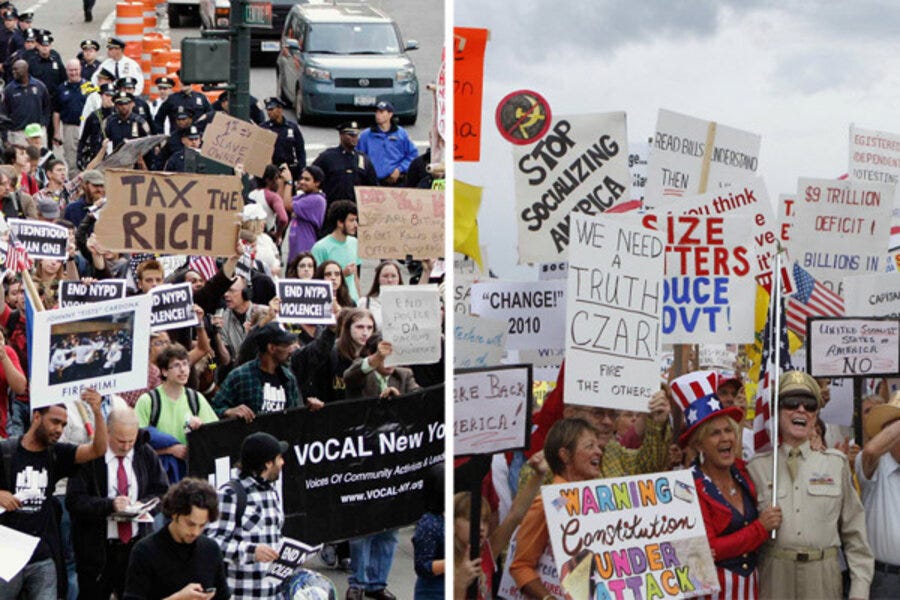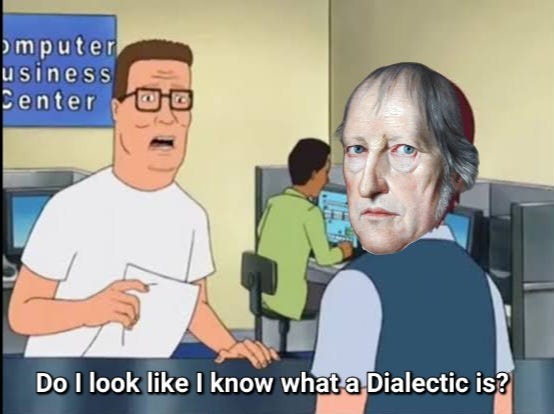Manifesting Chicken and Dumplings
Living Through a Realignment and the Beginning of the End of the End of History
It’s funny the things that stick with you. Back in the early 2000s, there was a show on PBS called “Liberty Kids”. Essentially, it was a cartoon about the lives of three kids who experienced the events of the American Revolution firsthand and met figures like George Washington, Benjamin Franklin, Alexander Hamilton, and all those other fan favorites that kids wanted action figures of. It was somewhat of a weird pitch for a kid’s TV show and I’m not sure if it was peak Bush-era jingoism or that PBS had to make the show “educational,” but I didn’t care. When you’re a kid without cable a cartoon is a cartoon. Any port in a storm, right? (Also, shout out to other shows of the era on PBS like “Cyber Chase,” “Dragon Tales,” and “Sagwa: The Chinese Siamese Cat.” If you were a poor kid in the early 2000s, you know.)
Most of it was just American history with the less savory bits glossed over from the perspective of three plucky kids (one American, one British, and one French for 18th century diversity points), nothing too special. But for some reason, a particular episode ended up being one of my core memories. The Americans were losing to the British and Washington put Marquis De Lafayette in charge of a camped battalion that was of significant strategic importance. The good ol’ boys in said regiment were none too happy. One particular point of contention was the food being awful and the troops subsequently complaining. Lafayette, however, ended up saving the day with the power of positive thinking. He spoke to the troops and advised them to imagine their rotten pottage as their favorite dish- Marquis imagined the slop as some French dish (Coq Au Vin? Beef Bourguignon? Snails? something like that) and ate it happily. The troops then all bought in with only mild trepidation, one even remarking: “My mama made the best chicken an’ dumplins I ever ate!” before happily shoveling the gruel down his gullet. The day was saved, the battle was won, and we learned not to be prejudiced against French people (or something).
Fast forward 250 years or so to 2024 and things are a little different, but in some ways very much the same. Spoiler alert: we won the Revolutionary War. The future existence of the United States is still uncertain. However, It’s not the looming threat of the English, but the existential threat of the breakdown of political and social cohesion. There seems to be an unbridgeable gap between two increasingly polarized sides of American society. We seem to have such radically different visions of the past, present, and future of our country that the talk of states seceding, or even civil war, is no longer a hyperbolic talking point.
The problems we have are many and complicated. Four years after the “racial reckoning” of 2020, the issue is unresolved and papered over with corporate DEI initiatives. Roe V. Wade was overturned, and the legality and ethics of abortion are back on the table. The transgender debate has transcended the issue itself and has become a symbol of one’s cultural values. There is a debate on immigration that has caused a crisis on the border that may also trigger a constitutional crisis. And perhaps most worrying, both sides of the political spectrum have questioned the legitimacy of the last two elections and both sides seem to think the other will subvert democracy in this year's election. With democracy itself and who will control the future of the United States uncertain, the stakes could not be higher.
The future is no longer certain internationally, either. The “Pax Americana” that once felt like it would last generations is coming to an abrupt end. Russia seems to not only be winning the war in Ukraine, but the economic sanctions have backfired, and the Russian economy is the strongest it has been since the Soviet era. China is flexing its muscles and attempting to create an alternative global financial system to undercut the US. There is a conflict in Israel, one of the nations the US has the strongest diplomatic ties with, that’s already resulted in tens of thousands of deaths and may well reignite conflict in the middle east and further galvanize the developing world against the United States.
The two major political parties have retrenched their positions and doubled down on appealing to their supposed bases. Republicans tout being conservative- both fiscally and socially- but seem to always outspend the Democrats. The Republicans have made Donald Trump- a serial adulterer- the leader of their movement. Democrats are supposed to be the party of the working class and social progressiveism, but they increasingly appeal most strongly to the college educated, professional managerial class and, despite rhetoric about diversity, they offer little more than tokenism and yet another old white guy as their candidate.
How did we get here? How is it that our choice has come down to two unlikable candidates that seem to be so far from the stated values of their party and base? Perhaps more importantly, how is it that in matter of policy these parties often seem to align so strongly on core issues and only differ on social issues? Despite the rhetoric, neither party seems to have seen a war it won’t support (when push comes to shove), an American industry it won’t offshore, or a corporate bailout they won’t happily give.
Depending on where you are on the political spectrum, you will likely have a strong opinion on all these events and who is responsible. US politicians and media figures all seem to have answers. It’s the fault of the Russians. It’s the Chinese. It’s the communists. It’s wokeness. It’s systematic racism. It’s the left. It’s the right. It’s because capitalism is failing. It’s because we didn’t let capitalists do capitalism hard enough. It’s the rise of populism. It’s the elites. The list goes on. All this frustration and anxiety but nothing ever seems to change.
We supposedly live in an age of political extremism. If you read what comes out of the media about this topic, we are said to be inundated with the rise of the far right or the far left in a way that stretches the Overton window to goatseian levels. I found myself thinking about these terms that are used. What does “left” or "right" even mean? What does “capitalism” or “socialism” even mean? What is “fascism” or “communism?” What the hell is a “Nazi” and why does literally fucking everyone compare their opponents to them? If you are a politically minded person like me that likes to find their own answers rather than rely on what others will tell you, I’m sure you already know the answers to these questions. In fact, they are fairly well defined. I am not really interested in dictionary definitions, however. I am interested in practical definitions.
So, what are some practical definitions of left and right? That seems like a good place to start. What do the terms “left” and “right” mean? The terms have their origins in the French revolution. Originally, it referred to support of or opposition to the monarchy with the former sitting in the right wing of the French National Assembly and the latter sitting on the left wing. Kind of a neat historical tidbit, but not really useful to our question in the modern, American context. What the hell do French aristocrats have to do with drag queen story hour and gun rights?
These days “left” and “right” are synonymous with “liberal” and “conservative” in the American social political context, but these terms don’t really make sense, either. Our modern definitions of “liberal” and “conservative” largely are based on the culture wars of the 1960s. However, half a century later, these terms hardly seem to accurately describe our political reality. For better or for worse, liberalism has near total ideological capture in almost all institutions of power and social conservatism is on the back foot. Perhaps “progressive” and “reactionary” are better terms? Do the terms that applied to the architects of the FDR New Deal administration and the acolytes of William F. Buckley have any relevance to the modern political coalitions we see today?
As I alluded to, our current definitions of “liberal” and “conservative” come from the New Deal era of the Roosevelt administration. Modern, American liberalism, broadly speaking, is descended from the FDR administration and the radical changes they created. It was an ideology that proposed that the only way to transform the US was to change the people themselves. This would be done through the application of social sciences via powerful institutions led by experts. Through these institutional reforms, working and marginalized people can be elevated and empowered. The conservatives, by contrast, are largely intellectual descendants of writer William F. Buckley. Buckley reformed and united the fractured factions of the American right into a unified movement. They questioned the institutional methods of the New Deal consensus and argued the over-reach of government infringed on individual liberty and weakened traditional American values of individualism and self-reliance. In the modern era, however, the differences have become mostly that of culture wars that focus on social reform and its scope and application as well as the role of government in the lives of the people. Foreign policy is largely off the table. The free market is an unquestioned good. Attitudes towards big business are in lockstep. That is the consensus. Those outside of it are extremists.
There are two examples of supposed modern day extremism that are exemplified in the campaigns of Donald Trump and Bernie Sanders that broke from traditional liberalism and conservatism in the American context. The campaigns of Bernie Sanders and Donald Trump were both outside of what had been considered the political norms. They both grew out of populist movements in the post-2008 global financial crisis. Both candidates and movements posited that the elites in the US had left ordinary people behind (though thier definitions of “elites” and “ordinary people” differed pretty significantly). They both inspired mass movements, fanatical support and opposition and brought in groups of people who were normally politically disengaged. The establishment powers seemed to throw all their strength at these movements to stop them, but despite the opposition, Donald Trump was elected president and Bernie Sanders created an openly socialist wing of the Democratic party that advocated for policies that had been off the table for a century.
So, what came of these political outsiders shifting the political conversation of what is possible? Do we have a nativist revival and a wall on the boarder as Trump and his base wanted? Have the proletariat risen up and seized free healthcare and education like Sanders and his supporters hoped for? Despite all his bluster, Trump largely governed like a standard Republican. Trump filled his cabinet with all of the neo-con goons from the Bush administration(s) that he railed against on the campaign trail and his policies reflected that. The swamp remains undrained. Sanders and his coalition were brought into the fold of the Biden administration, but they have been marginalized and their platforms receive little more than token support. The policies he and his supporters championed were ignored or gutted. Sanders and his wing of the party have been absorbed into the consent-manufacturing machine. The American political system seems more entrenched and more stagnated since 2015, not less.
How has all that energy been diffused? No one seems to be happy, and no one feels like they are being represented. No matter what we want, at the end of the day we have to vote republican or democrat. If you are not a member of the small groups of people the current regime and it’s two ruling class factions represent, your pickins are slim. Your options seem to be holding your nose and voting for someone who only marginally supports your interests, a symbolic third-party vote or sitting out the vote all together. Increasingly, people seem not to vote for a candidate, but against one. We have come to the point where people vote based on either harm reduction or using their vote as a punitive, vindictive, and ultimately impotent act of defiance against vaguely defined cultural enemies. People hunger for substance but none is offered.
So where does this leave us? I can’t help but feel that I’m back in that camp with those Revolutionary War soldiers huddled around a campfire waiting for a measly dollop of unseasoned slop. Yet again, we are asked to grin and bear it and pretend the gruel is something a little more substantial. You can imagine your slop is radical Marxist socialism. You can pretend that your vote against Trump is an act of anti-fascist action like you’re in the French resistance in 1942. You can pretend your vote against Biden is a manuscript of anti-communist resistance smuggled out to the world like Alexander Solzhenitsyn writing from the Gulag. You can pretend you’re the shock troops of some neo-reactionary, based, and red pilled monarch. It doesn’t matter. Hold your nose. Chew. Swallow. Grin, and tell yourself, “This is actually chicken and dumplings," but that’s not on the menu. Until something changes, we are all eating the same slop of neoliberal late capitalism.
In 1992, author Francis Fukuyama wrote his seminal work “The End of History and the Last Man.” In this book, Fukuyama describes how liberal democracy has become the endpoint of the historical process of Hegelian and Marxist dialectics. This historical process of conflict resolution existed in three parts: the thesis, antithesis, and synthesis. Essentially, when a society exists (thesis) once it grows to a certain level internal contradictions will arise (antithesis) and conflict will erupt that will resolve the contridiction (synthesis) and the society will either stabilize or be defeated by another society better suited to the challenges of the time and the process will begin again. Hegel posited that history was not determined through linear development and progress, but through blind interplay and conflict of societies with competing values and government systems until that conflict selected for the best possible system to provide individuals both material stability and social recognition. This would be the end of history- not in the sense that events would stop occurring, but in the sense that the historical process had finished as the endpoint of development had been reached. Marx built on this idea and theorized that instead of strong states, this historical process would lead to the rise of communism due to Hegel’s inability to address class conflict. Fukuyama built on the works of Hegel and Marx, asserting that liberal democracy was the final stage of historical development.
Okay, maybe that is a little heady. Essentially, all of the millennias of civilization have been one, long troubleshooting process to find the best possible system and now with liberal, capitalist democracy, history has reached its endpoint with our current society. This is a conclusion that Fukuyama believed was self-evident with the defeat of the Soviet Union by the United States in 1991. With the subsequent fall of communism, liberal democracy had triumphed in the conflict of historical process and history had ended. Nothing else will happen because nothing else can happen. The US used their newfound hegemony to ensure free trade and make the world safe for democracy. This is a security that is one of the few things Democrats and Republicans agree on, and it’s referred to as “the post-war consensus.” This was the total victory of liberal democracy- and by extension, US global hegemony. Many act as if this is true and that we are at the end of history, but it seems that history hasn’t quite ended after all.
The “End of History” seems to be something we have all internalized- conciously or unconciously. It is easy to take our current moment in history for granted and feel like it’s unchangable. In “Capitalist Realism” author Mark Fisher states that it is easier to imagine the end of the world than the end of capitalisim. Much in the same way, it’s easier to imagine the end of the world than the end of our current regime. And with the very realistic possability of another world war seemingly on the horizon, this metaphor can feel uncomfortably literal. However, I don’t think things are as unchangable as they seem and there is good news and bad news. The bad news is that the world is ending. The good news is that the world is ending.
I don’t mean that in the apocalyptic sense, but in the descriptive sense. The world we knew is ending in a political and social realignment. This has happened many times before. In the US, we can take our current regime as an example. We are currently in what historians refer to as “the fifth party system.” The fifth party system began when the FDR administration arose to address a specific set of problems the US was facing. The fifth party system was formed to address the problem of the great depression, civil rights, racial equality, and the need for a stronger national defense. The fourth party system arose to deal with the change of the US from an agrarian society to an industrial one, women’s and workers rights as well as the economic inequality of the gilded age. The third party system arose to deal with the issues of slavery, the Civil War and reconstruction. The second party system arose to address the changes of the expansion of US territories into the frontier and if those new states will be free or slaveholding. The first party system directly followed the Revolutionary War and the issues of the scope of federal power, the question of a national bank and how to deal with European powers now that the United States was an independent nation. This is a process that has happened many times before and one that is happening right now.
The 6th party system will likely address the effects of deglobalization, the post-industrial information age and the world solidifying into regional zones of power. We will deal with and redefine what it means to be American. We will potentially deal with reindustrialization and its effects. We will resolve the conflict of populism vs elitism. We will have to find a real solution to race relations and inequality. The current system will have to fall and be replaced by another since it is not equipped to deal with the crisis we are currently experiencing just as the systems we had before this one collapsed when they were no longer equipped to deal with the issues that defined the era. The current regime was created to fight the cold war. Without that context, it has no reason to exist and will be replaced by one better suited to the current moment. Coalitions are shifting. New structures of power will arise that better suit the more localized and regionally focused future. As the way we see and govern ourselves changes, so will the way we deal with the world. Foreign policy and the way business is done will have to change to accommodate that and new structures and incentives for power will emerge. New social norms and conventions will emerge to fit the economic changes. This is happening now and if you want to know how the future may unfold, look to the past.
We are going to see massive change within our lifetime. Don’t get too attached to the current system since it’s ending sooner than you think. We are the ones who will live through this change and create the coalitions and systems that will last for generations. I don’t know what will happen. Maybe it will be sweeping social and political reforms. Maybe it will be another Great Depression. Maybe it will be a war. I do know that what we are doing now isn’t working. So, if you want to be prepared, get involved in your local community. Build social capital. Get to know your neighbors-you likely have a lot more in common with them than you think. These relationships will be the foundation the coalitions of the future will be built upon. This is how we can advocate for ourselves. The future is local. So, hold on tight. It’s going to be a bumpy ride.











It was a blessing and a curse to know what you meant by "goatseian" without googling it.
I had not heard of the "party system" model of U.S. history, I like the framework. Something I need to read up on